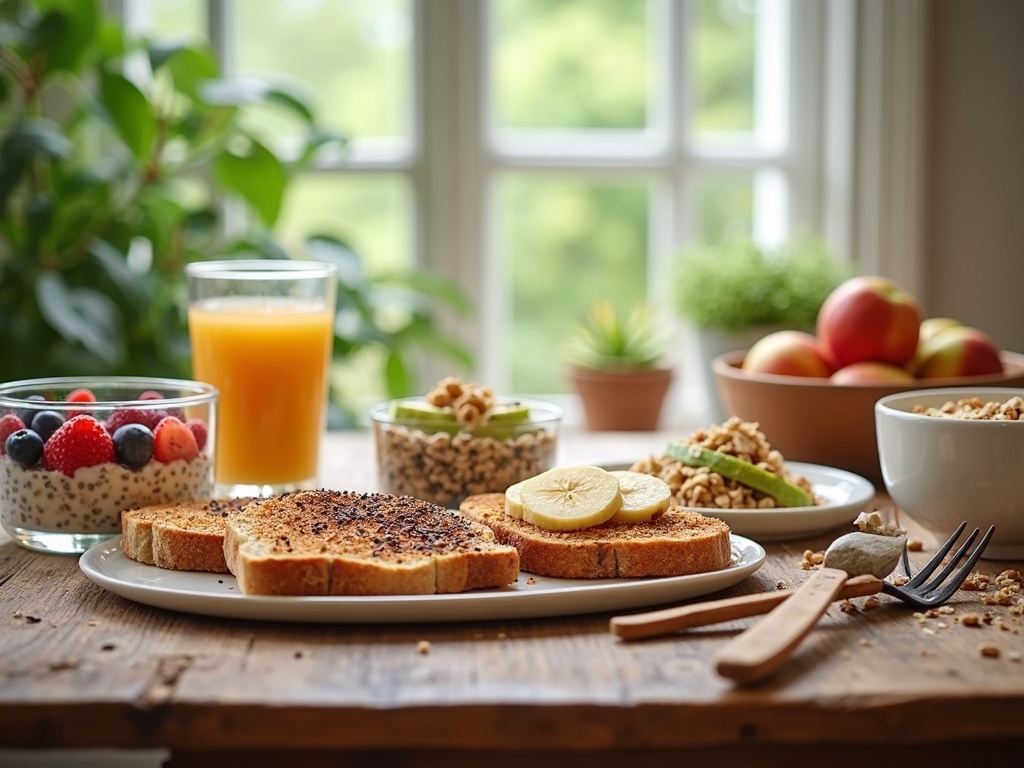Starting my day with nutritious breakfast foods gives my brain and body essential fuel, which improves my thinking ability and keeps my blood sugar steady throughout the day. Studies confirm that people who eat a balanced morning meal feel mentally better and maintain steady energy levels, making breakfast essential for a healthy lifestyle.
Find In This Article
Key Takeaways
- A balanced breakfast should include protein (eggs, Greek yogurt), whole grains, healthy fats, and fruits or vegetables for optimal nutrition.
- Eating breakfast helps prevent overeating later in the day by stabilizing blood sugar and reducing intense hunger pangs.
- Quick options like overnight oats, Greek yogurt parfaits, and smoothie bowls can provide complete nutrition without requiring extensive morning preparation.
- Global breakfast traditions offer nutritious inspiration, from protein-rich English breakfasts to probiotic-packed Japanese options with fermented foods.
- Common breakfast mistakes include choosing sugary processed foods, skipping protein, waiting too long to eat after waking, and not preparing ingredients in advance.
Why Your Morning Meal Matters
I’ve noticed that many people underestimate the power of breakfast. It’s alarming that 44% of adults fail to meet USDA breakfast guidelines, often skipping this crucial meal entirely. Starting your day with nutritious breakfast foods isn’t just about satisfying morning hunger—it’s about setting yourself up for success.
Brain Benefits and Mood Enhancement
Studies show breakfast improves cognitive performance and mood throughout the day. When I eat a balanced morning meal, I can focus better and maintain mental clarity during important tasks. This brain boost happens because breakfast replenishes glucose levels after the overnight fast, providing essential fuel for brain function.
I’ve found that skipping breakfast often leads to poor concentration and irritability. The connection between breakfast and mood isn’t just anecdotal—research confirms that people who eat breakfast regularly tend to report better overall mental wellbeing.
Metabolic and Energy Benefits
Eating breakfast helps prevent overeating later in the day by stabilizing blood sugar and reducing intense hunger pangs. I’ve noticed on days when I skip breakfast, I’m much more likely to grab unhealthy snacks mid-morning or overindulge at lunch.
The impact on metabolic health is significant too. Regular breakfast consumption promotes better energy regulation throughout the day. To maximize these benefits, I make sure my healthy breakfast foods contain these key nutrients:
- Protein (eggs, Greek yogurt, or halal meat) to build and repair tissues
- Whole grains (oatmeal, whole wheat toast) for sustained energy
- Healthy fats (avocado, nuts, seeds) for brain health and satiety
- Fruits and vegetables for vitamins, minerals, and fiber
When I include these components in my morning meal, I feel fuller longer and maintain stable energy levels until lunchtime. This balanced approach to breakfast foods helps me avoid the mid-morning energy crash that often happens with sugary breakfast options.
Starting the day with a thoughtful breakfast doesn’t require elaborate cooking skills or expensive ingredients. Simple combinations like Greek yogurt with fruit and nuts or eggs with vegetables on whole grain toast deliver the nutrition needed to kickstart your metabolism and fuel your brain.
By prioritizing breakfast, I’ve found I can make better food choices throughout the day, maintain more consistent energy levels, and support my long-term health goals. The short time investment in preparing a quality morning meal pays dividends in productivity and wellbeing that last all day.
Quick and Nutritious Breakfast Ideas
Starting your day with nutritious food doesn’t have to be time-consuming. I’ve discovered several quick breakfast options that pack a nutritional punch while fitting into busy morning routines.
Time-Saving Breakfast Solutions
Overnight oats have become my go-to morning meal when I’m pressed for time. I simply mix rolled oats with milk or plant-based alternatives, add a tablespoon of chia seeds, and let it sit in the refrigerator overnight. By morning, I have a ready-to-eat breakfast that I can top with fresh fruits for a delicious breakfast that keeps me full until lunch.
Greek yogurt parfaits offer another speedy option with impressive protein content. I layer Greek yogurt with honey, fresh berries, and a sprinkle of granola for texture. This combination provides protein, calcium, and antioxidants in one convenient package.
For mornings when I need something warm, whole grain toast topped with avocado or nut butter delivers healthy fats and fiber. I often add a sliced banana or a drizzle of honey to my nut butter toast for natural sweetness.
Smoothie bowls make healthy breakfast foods feel like a treat. I blend frozen fruits with a liquid base, pour it into a bowl, and top with nuts, seeds, and a small amount of granola. This option allows endless customization while providing essential nutrients to kick-start my day.
Hard-boiled eggs paired with whole grain toast create a protein-rich breakfast that takes minimal preparation. I often boil a batch of eggs on Sunday to have quick things to eat for breakfast throughout the week.
The key to consistent, nutritious breakfasts lies in preparation. Here are some meal prep strategies that save valuable morning minutes:
- Prepare overnight oats in batches using mason jars
- Wash and portion berries and fruits in advance
- Pre-portion nuts and seeds in small containers
- Boil eggs for the week during weekend prep
- Make freezer-friendly smoothie packs with pre-measured ingredients
- Toast several slices of bread and freeze them for quick reheating
With these best healthy breakfast ideas and a bit of preparation, you can transform your morning routine without sacrificing nutrition or flavor. Most of these options require less than five minutes of morning prep time while delivering the energy and nutrients needed for a productive day.
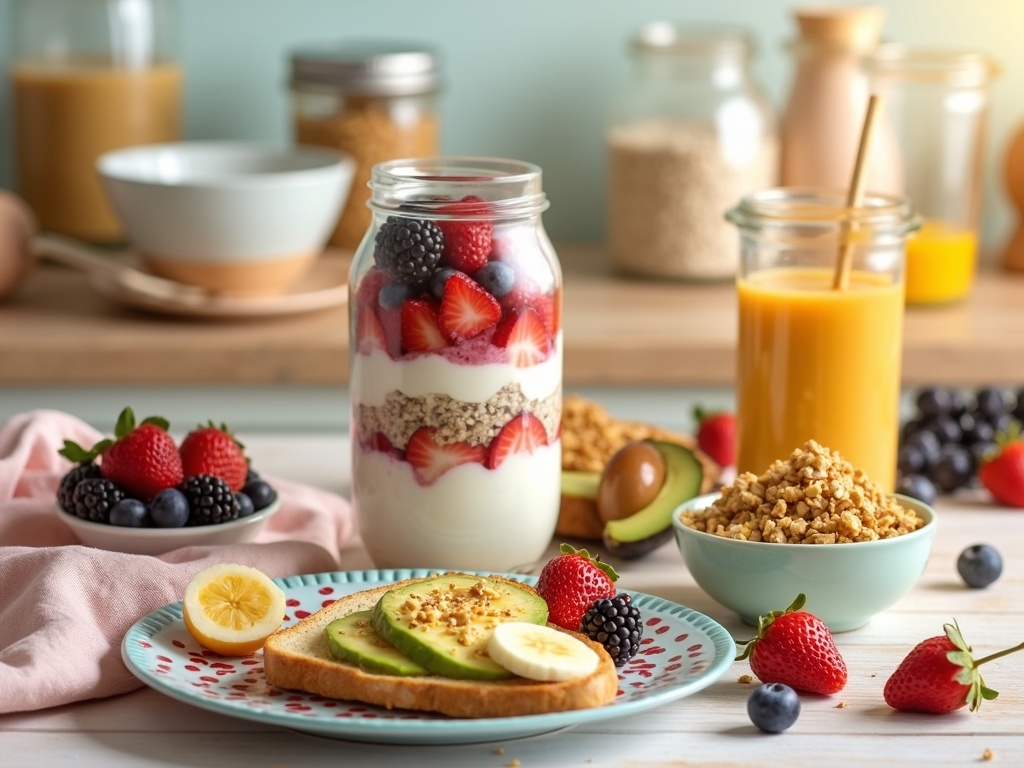
Power-Packed Ingredients for Your Morning
I’ve discovered that selecting the right breakfast ingredients makes all the difference in how I feel throughout the day. Starting with nutrient-dense foods provides lasting energy and helps me avoid mid-morning crashes that send me hunting for snacks.
Morning Fuel That Keeps You Going
Whole grains form the perfect foundation for any best breakfast foods lineup. Oats contain beta-glucan fiber that helps maintain steady blood sugar levels, while quinoa offers complete protein and a nutty flavor profile. I often prepare overnight oats with cinnamon for quick grab-and-go mornings.
Protein is crucial for rebuilding muscles and creating satiety. Eggs remain my go-to protein source – they’re versatile and packed with choline for brain health. Greek yogurt delivers double the protein of regular yogurt, while nut butters like almond or cashew spread add creamy protein to toast or smoothies.
Fresh fruits bring natural sweetness and essential vitamins to healthy breakfast foods. These vibrant options enhance any morning meal:
- Berries (blueberries, strawberries) offer antioxidants and lower sugar content.
- Bananas provide potassium and natural energy.
- Apples contain pectin fiber that supports digestive health.
Don’t forget vegetables! Adding spinach to scrambled eggs or smoothies delivers iron without altering taste. Avocado brings healthy fats that keep hunger at bay until lunch.
Dairy or alternatives provide calcium and protein. Traditional milk works wonderfully, but plant-based options like almond milk (for low-calorie options) or oat milk (for creamier texture) make excellent substitutes for those with sensitivities or preferences.
For those with a sweet tooth, natural sweeteners can enhance things to eat for breakfast without causing sugar spikes. A drizzle of honey adds antimicrobial benefits, while maple syrup contains minerals like manganese and zinc. The key is moderation – a little goes a long way.
I’ve found mixing and matching these ingredient categories creates endless breakfast foods possibilities that never get boring. My favorite combination? Overnight oats with Greek yogurt, mixed berries, a tablespoon of almond butter, and just a touch of honey – it hits every nutritional mark while tasting like a treat.
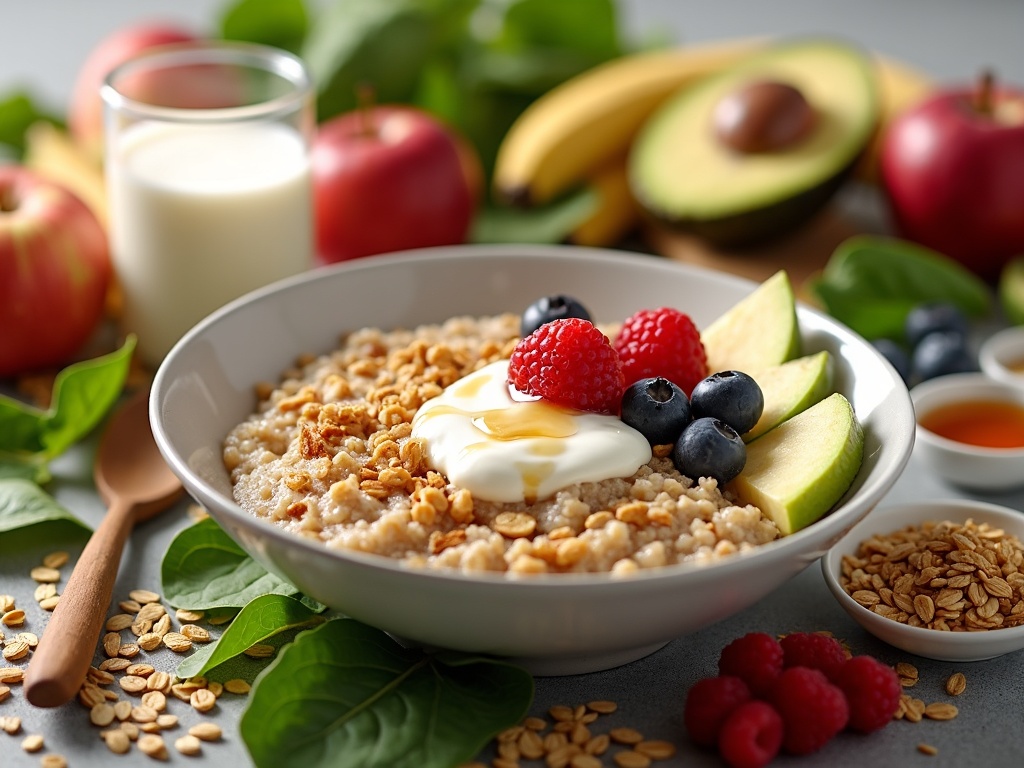
Global Breakfast Traditions Worth Trying
Breakfast customs across the globe can teach us a lot about nutrition, cultural values, and starting the day right. I’ve found that exploring different breakfast traditions has enhanced my morning routine and provided new flavors to enjoy. Many of these best breakfast foods from around the world can be adapted to fit our busy modern schedules while still delivering excellent nutrition.
Cultural Breakfast Highlights
The Traditional English breakfast, often called a “full English,” stands as one of the most hearty morning meals globally. It typically includes eggs (usually fried or scrambled), bacon, sausages, grilled tomatoes, baked beans, toast, and sometimes black pudding. This protein-rich start to the day originally fueled workers through long physical labor. Today, I can create a lighter version by using turkey bacon, limiting portions, and adding extra grilled vegetables.
In Japan, a traditional morning meal takes a completely different approach. Natto (fermented soybeans) served with steamed rice forms the foundation of a nutritionally balanced breakfast. The preparation is straightforward—mix the sticky, fermented beans with a bit of soy sauce and mustard, then serve over fresh rice. Many Japanese breakfasts also include miso soup, grilled fish, and pickled vegetables. The fermentation in natto delivers probiotics that support gut health, making it one of the most healthy breakfast foods available.
Mediterranean breakfast traditions emphasize fresh, simple ingredients. A typical Greek morning meal might include Greek yogurt with honey and nuts, olives, feta cheese, and fresh fruit. In Lebanon and other Middle Eastern countries, you might find manakish (flatbread topped with za’atar) or labneh (strained yogurt) with olive oil and herbs. These foods deliver anti-inflammatory benefits and sustained energy without excessive calories.
Different cultures approach morning nutrition based on:
- Available local ingredients and agricultural traditions
- Historical work patterns and energy needs
- Climate considerations
- Religious practices
- Health philosophies
North African breakfasts often feature shakshuka—eggs poached in a spiced tomato sauce—which delivers protein and vegetables in one simple dish. In India, savory options like idli (fermented rice cakes) with sambar or paratha (flatbread) with vegetables dominate, providing complex carbohydrates and protein.
I’ve noticed that traditional breakfast foods across cultures share certain nutritional principles despite their diversity. Most contain a balance of protein, complex carbohydrates, and healthy fats. Many incorporate fermented foods (like yogurt, natto, or sourdough bread) that support digestive health. Fresh, seasonal ingredients also play a starring role in most traditional morning meals.
Adapting these global traditions for modern lifestyles doesn’t require hours in the kitchen. I prepare components in advance, like cooking a large batch of rice for Japanese-inspired breakfasts or preparing shakshuka base sauce on weekends. Overnight oats with Mediterranean toppings like figs, honey, and pistachios create a quick version of Greek breakfast flavors.
For busy mornings, I’ve found that breakfast foods from different cultures can be simplified while maintaining their nutritional benefits. A quick Mediterranean breakfast might be whole grain toast with labneh, olive oil, and za’atar. A Japanese-inspired option could be miso soup with pre-cooked rice and a soft-boiled egg.
These global breakfast traditions remind us that the first meal deserves attention and care. By borrowing things to eat for breakfast from various cultures, I’ve expanded my morning options beyond the typical cereal or toast. The result is a more varied, nutritious, and satisfying start to each day.
When exploring these traditional breakfasts, I focus on incorporating at least one best healthy breakfast element from each culture—whether that’s the protein from an English breakfast, the fermentation benefits of Japanese traditions, or the fresh, whole ingredients of Mediterranean morning meals.
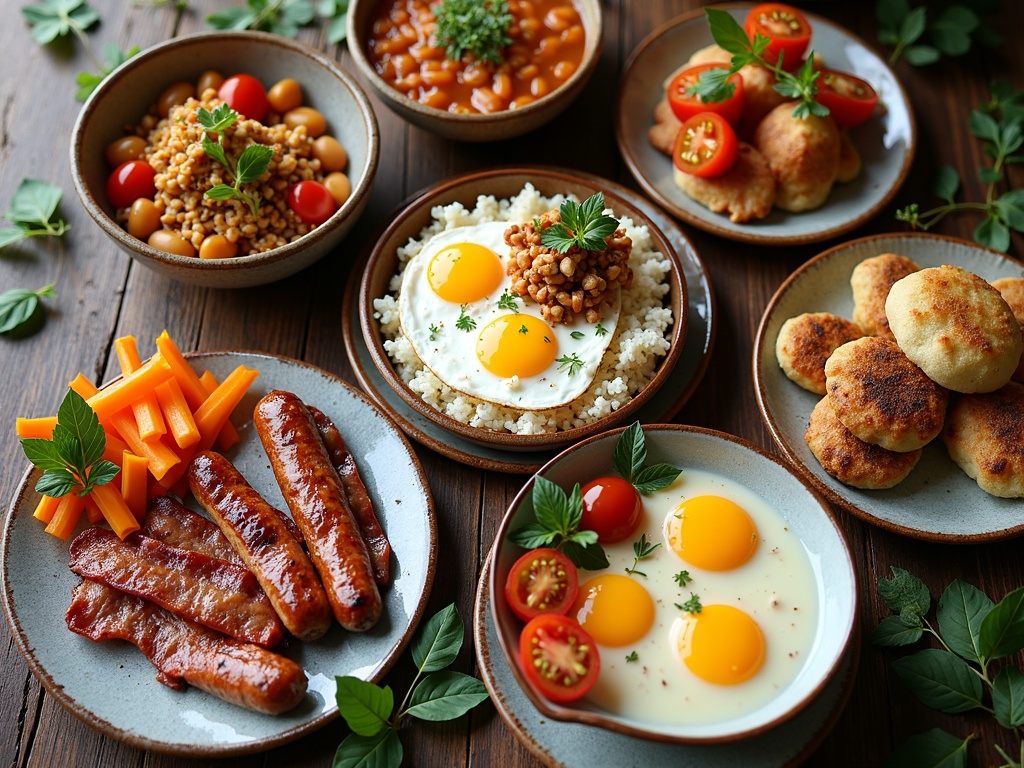
Common Breakfast Mistakes to Avoid
Starting your day with the right breakfast can set you up for success, but many of us fall into habits that sabotage our morning nutrition. I’ve noticed several patterns that can diminish the benefits of what should be the most important meal of the day.
Poor Food Choices and Timing
Reaching for sugary cereals and pastries might seem convenient, but these options cause blood sugar spikes followed by energy crashes. These processed foods lack the nutrients found in healthy breakfast foods and leave you hungry within an hour. Instead, I recommend choosing whole grain options or oatmeal topped with fresh fruit for sustained energy.
Skipping morning hydration is another common misstep. Your body becomes dehydrated overnight, so drinking water before coffee helps rehydrate your system and kickstarts metabolism. Try keeping a glass of water by your bedside to drink immediately upon waking.
Not including protein in your morning meal can leave you feeling unsatisfied and craving snacks mid-morning. Best breakfast foods include protein sources like eggs, Greek yogurt, or nut butters that keep you fuller longer and support muscle maintenance.
Waiting too long to eat after waking means your body remains in a fasting state, potentially slowing metabolism and encouraging unhealthy food choices later. I suggest eating within an hour of waking to fuel your body properly and maintain steady energy levels throughout the day.
Preparation Problems
Rushing through breakfast preparation often leads to poor choices. When pressed for time, many people grab whatever’s easiest—usually pre-packaged items high in sugar and low in nutrition. Taking just 10 minutes to prepare a best healthy breakfast can make a significant difference in your day.
Setting up overnight options like chia pudding or preparing ingredients the night before can save precious morning minutes. Even simple steps like washing berries or chopping fruits in advance makes assembling a nutritious breakfast much faster.
I’ve found that creating a rotation of quick, nutrient-dense breakfast options helps eliminate decision fatigue and ensures I start each day with proper nutrition. Having go-to breakfast foods that can be prepared in minutes—like avocado toast with an egg or a protein smoothie—provides the perfect balance of convenience and nutrition.
Remember that breakfast doesn’t need to be complicated to be effective. The goal is consistent, nutritious morning eating that powers your day, not perfection.
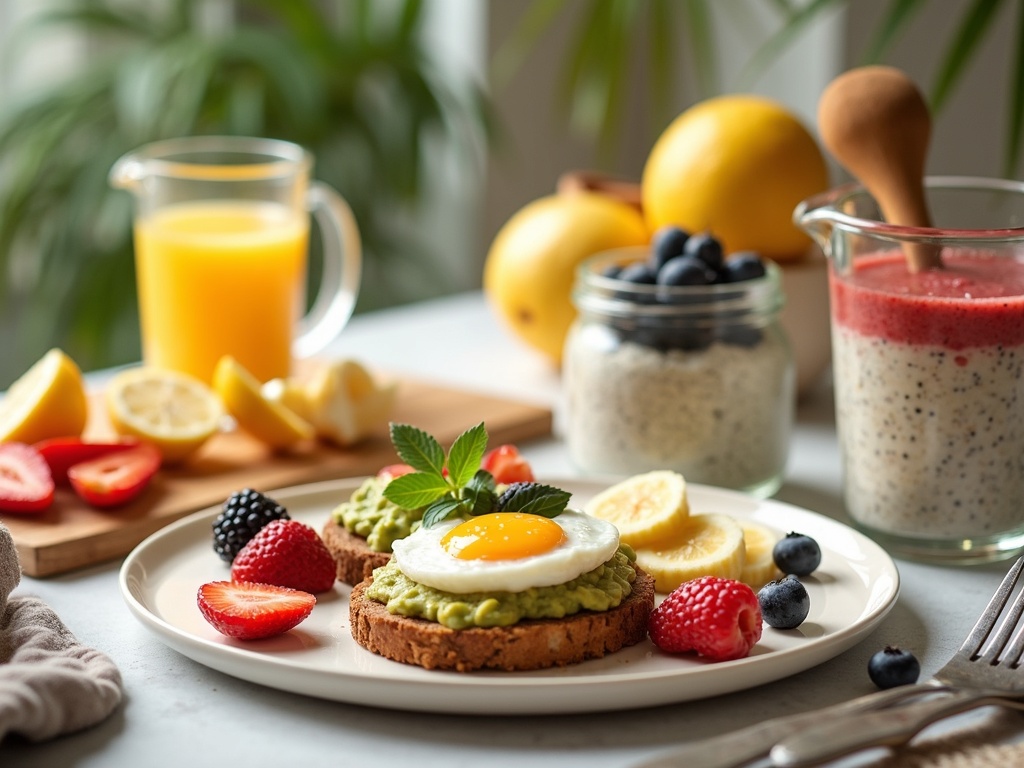
Breakfast for Special Diets
Dietary restrictions don’t mean sacrificing a delicious morning meal. I’ve discovered that with a bit of creativity, special diets can lead to some of the most satisfying best breakfast foods you’ll ever try. Let’s explore options that cater to different nutritional needs while keeping your taste buds happy.
Plant-Based and Restriction-Friendly Options
For those following a vegan lifestyle, plant-based yogurt parfaits make a perfect morning treat. I layer coconut or almond yogurt with fresh berries, a sprinkle of granola, and a drizzle of maple syrup for a protein-packed start. This simple yet filling option provides essential nutrients without animal products.
Keto followers can enjoy eggs with avocado – a match made in breakfast heaven. I like to prepare mine with two fried eggs atop half an avocado, seasoned with salt, pepper, and a dash of hot sauce. This combination delivers healthy fats and keeps carbs minimal, helping maintain ketosis throughout the morning.
Gluten-free eaters aren’t left behind with quinoa breakfast bowls taking center stage. I cook quinoa in almond milk until fluffy, then top it with sliced bananas, cinnamon, and crushed walnuts. The result? A protein-rich, gluten-free alternative to traditional oatmeal that keeps hunger at bay until lunch.
Targeted Nutritional Needs
Athletes require specific nutrition to fuel their activities, and high-protein breakfasts fit the bill perfectly. I’ve found these healthy breakfast foods particularly effective:
- Greek yogurt bowl with almonds and honey
- Protein smoothie with banana, berries, and plant protein
- Cottage cheese topped with fresh fruit and a sprinkle of flaxseeds
- Turkey and vegetable egg white omelet
- Tofu scramble with bell peppers and spinach
Each option delivers at least 15-20 grams of protein, supporting muscle recovery and providing sustained energy for training sessions.
For those managing diabetes, low-sugar breakfasts prevent blood glucose spikes while still offering satisfaction. I recommend starting your day with savory options like a vegetable frittata or a bowl of steel-cut oats topped with cinnamon and a small amount of berries. The fiber content in these breakfast foods helps moderate blood sugar levels.
Another great diabetes-friendly option is chia seed pudding made with unsweetened almond milk and flavored with vanilla extract instead of sugar. I prepare mine the night before, allowing the seeds to absorb the liquid and create a pudding-like consistency by morning.
I’ve noticed that many people with dietary restrictions struggle to find variety in their things to eat for breakfast. The key is thinking beyond traditional breakfast foods. Leftover grilled chicken with roasted sweet potatoes can make an excellent morning meal for those on paleo diets. Similarly, a small portion of salmon with cucumber slices works wonderfully for pescatarians watching their carb intake.
Children with food sensitivities deserve special consideration too. I create allergy-friendly pancakes using banana and oat flour for those avoiding eggs and dairy. Topped with sunflower seed butter instead of peanut butter, they’re safe for most children with common allergies.
The beauty of these specialized breakfast options is their flexibility. Most can be prepared in advance, saving precious morning time. Overnight oats, chia puddings, and pre-chopped fruit make best healthy breakfast options accessible even on the busiest days.
Don’t forget that staying hydrated is equally important for all dietary patterns. I start each morning with a glass of water before enjoying any of these top 10 breakfast foods for special diets, helping to jumpstart metabolism and support digestion right from the start.
Sources:
USDA, Importance of Breakfast
Journal of Nutrition Education and Behavior, Nutrition in the Early Years
American Journal of Clinical Nutrition, Skipping Breakfast: A Common Mistake
Harvard Health, Healthy Breakfast Choices

